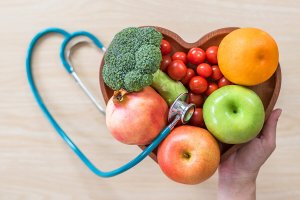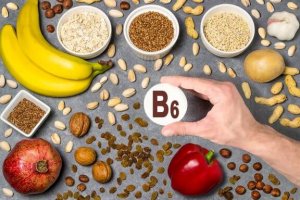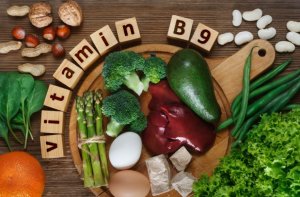Benefits and Properties of Vitamin B Complex

The large vitamin B complex is related to cellular metabolism. Unlike other complexes, vitamin B complex is water soluble; this means it’s eliminated by urine. In the following article, we’ll tell you the main benefits and properties of this ‘family’ of nutrients that are so important for our health.
The vitamin B complex
Until a while ago, it was believed that vitamin B was only one vitamin with different benefits. However, subsequent investigations indicate that vitamin B is first and foremost a group, with no less than eight members.
In general, the B complex as a whole is good for reducing swelling, maintaining cognitive function and having a better mood. People with a high amount of vitamin B in their bodies are more motivated and have less chance of developing heart disease.
You might also like: Vitamins are a Fundamental Pillar in Nutrition
On the contrary, the insufficiency of said vitamins is related to DNA damage. Lack of vitamin B has a correlation to the appearance of colon cancer. Since the body cannot produce vitamins, we must consume them through food. This way, the body will work better and the risk of becoming sick will be reduced.
The B complex is water soluble, so these vitamins are not stored in fat. Vitamin B has the ability to seep through the kidneys and is eliminated through the urine.
Knowing the whole vitamin B complex family
It’s well known that the vitamin B complex has many ‘sub-vitamins’ (to give them a name), but why are they useful and beneficial? They’re important for the health of the skin, nails, hair, blood, nervous system and immune system. And although they’re all beneficial, each of them has special advantages:
Vitamin B complex: B1 or thiamin
Its main task is to convert carbohydrates into energy; therefore, it’s essential in physical exercise. In addition, it helps to improve the nervous system and keep it in good condition.
B2 or riboflavin
Vitamin B2 is one of the most important vitamins related to the production of red blood cells. Remember, red blood cells are responsible for transporting oxygen through the body. Vitamin B2 also contributes to the conversion and better absorption of vitamin B6.

B3 or niacin
Its main property is to take energy from food, improving the digestive system. Its molecular structure is ideal to act upon the digestive and nervous systems, keeping them healthy. Vitamin B3 also acts in the dermis, repairs DNA and produces hormones, especially stress and sex hormones.
Vitamin B complex: B5 or pantothenic acid
Its essential task is to release energy from food, but it also has the ability to produce neurotransmitters in the brain. In turn, it helps assimilate vitamin B2 and regulate cholesterol.
B6 or pyridoxine
It’s a fairly ‘busy’ vitamin, which helps in more than a hundred different physical reactions. Among them, are those of producing hemoglobin, hormones that intervene in the sleep cycle and to store sugar in the liver, which will be used when the body considers it necessary.
B7 or biotin
It allows the body to break down fat and bone growth. It also has an important role in hair health.
B9 or folic acid
Vitamin B is very important for pregnant women, especially B9 vitamin. Folic acid is even more important, as it’s involved in the production of DNA and red blood cells. Its consumption is essential during pregnancy.
B12 or cyanocobalamin
Known for its participation in improving the health of the nervous system, producing red blood cells, releasing energy from food and metabolizing proteins. Lack of vitamin B can result in some diseases, such as beriberi, Wernicke encephalopathy, pernicious anemia, pellagra, and megaloblastic anemia.

Where is vitamin B complex found?
After knowing all the advantages and properties of vitamin B in each of its variables, you’ll undoubtedly want to know where you can get it naturally. We can say that the eight types of this vitamin are ‘combined’ in almost the same foods. This means that, by ingesting them, we’re incorporating more than one vitamin B.
In your diet, you cannot miss the following foods: lean meats, legumes, dairy, green leafy vegetables, whole grains, and eggs. At the same time, you should avoid consuming processed foods, as they make it impossible for your body to assimilate the nutrients.
Read more: The Importance of Including Vitamin E In Your Diet
In the case of vegans or vegetarians, they should know that vitamin B12 cannot be obtained from plant sources or cereals. Therefore, it’s usually necessary to consume a supplement or soy-based food.
The vitamin B complex has many benefits, and therefore it’s necessary that we consume it. By following a balanced diet and leaving aside processed foods, we won’t have any problems in meeting the daily requirements of this fantastic vitamin group.
The large vitamin B complex is related to cellular metabolism. Unlike other complexes, vitamin B complex is water soluble; this means it’s eliminated by urine. In the following article, we’ll tell you the main benefits and properties of this ‘family’ of nutrients that are so important for our health.
The vitamin B complex
Until a while ago, it was believed that vitamin B was only one vitamin with different benefits. However, subsequent investigations indicate that vitamin B is first and foremost a group, with no less than eight members.
In general, the B complex as a whole is good for reducing swelling, maintaining cognitive function and having a better mood. People with a high amount of vitamin B in their bodies are more motivated and have less chance of developing heart disease.
You might also like: Vitamins are a Fundamental Pillar in Nutrition
On the contrary, the insufficiency of said vitamins is related to DNA damage. Lack of vitamin B has a correlation to the appearance of colon cancer. Since the body cannot produce vitamins, we must consume them through food. This way, the body will work better and the risk of becoming sick will be reduced.
The B complex is water soluble, so these vitamins are not stored in fat. Vitamin B has the ability to seep through the kidneys and is eliminated through the urine.
Knowing the whole vitamin B complex family
It’s well known that the vitamin B complex has many ‘sub-vitamins’ (to give them a name), but why are they useful and beneficial? They’re important for the health of the skin, nails, hair, blood, nervous system and immune system. And although they’re all beneficial, each of them has special advantages:
Vitamin B complex: B1 or thiamin
Its main task is to convert carbohydrates into energy; therefore, it’s essential in physical exercise. In addition, it helps to improve the nervous system and keep it in good condition.
B2 or riboflavin
Vitamin B2 is one of the most important vitamins related to the production of red blood cells. Remember, red blood cells are responsible for transporting oxygen through the body. Vitamin B2 also contributes to the conversion and better absorption of vitamin B6.

B3 or niacin
Its main property is to take energy from food, improving the digestive system. Its molecular structure is ideal to act upon the digestive and nervous systems, keeping them healthy. Vitamin B3 also acts in the dermis, repairs DNA and produces hormones, especially stress and sex hormones.
Vitamin B complex: B5 or pantothenic acid
Its essential task is to release energy from food, but it also has the ability to produce neurotransmitters in the brain. In turn, it helps assimilate vitamin B2 and regulate cholesterol.
B6 or pyridoxine
It’s a fairly ‘busy’ vitamin, which helps in more than a hundred different physical reactions. Among them, are those of producing hemoglobin, hormones that intervene in the sleep cycle and to store sugar in the liver, which will be used when the body considers it necessary.
B7 or biotin
It allows the body to break down fat and bone growth. It also has an important role in hair health.
B9 or folic acid
Vitamin B is very important for pregnant women, especially B9 vitamin. Folic acid is even more important, as it’s involved in the production of DNA and red blood cells. Its consumption is essential during pregnancy.
B12 or cyanocobalamin
Known for its participation in improving the health of the nervous system, producing red blood cells, releasing energy from food and metabolizing proteins. Lack of vitamin B can result in some diseases, such as beriberi, Wernicke encephalopathy, pernicious anemia, pellagra, and megaloblastic anemia.

Where is vitamin B complex found?
After knowing all the advantages and properties of vitamin B in each of its variables, you’ll undoubtedly want to know where you can get it naturally. We can say that the eight types of this vitamin are ‘combined’ in almost the same foods. This means that, by ingesting them, we’re incorporating more than one vitamin B.
In your diet, you cannot miss the following foods: lean meats, legumes, dairy, green leafy vegetables, whole grains, and eggs. At the same time, you should avoid consuming processed foods, as they make it impossible for your body to assimilate the nutrients.
Read more: The Importance of Including Vitamin E In Your Diet
In the case of vegans or vegetarians, they should know that vitamin B12 cannot be obtained from plant sources or cereals. Therefore, it’s usually necessary to consume a supplement or soy-based food.
The vitamin B complex has many benefits, and therefore it’s necessary that we consume it. By following a balanced diet and leaving aside processed foods, we won’t have any problems in meeting the daily requirements of this fantastic vitamin group.
All cited sources were thoroughly reviewed by our team to ensure their quality, reliability, currency, and validity. The bibliography of this article was considered reliable and of academic or scientific accuracy.
- Esposito, G. (1998). Ácido Fólico Y Vitamina B 12 En La Nutrición Humana. Revista Cubana Aliment Nutr.
This text is provided for informational purposes only and does not replace consultation with a professional. If in doubt, consult your specialist.








